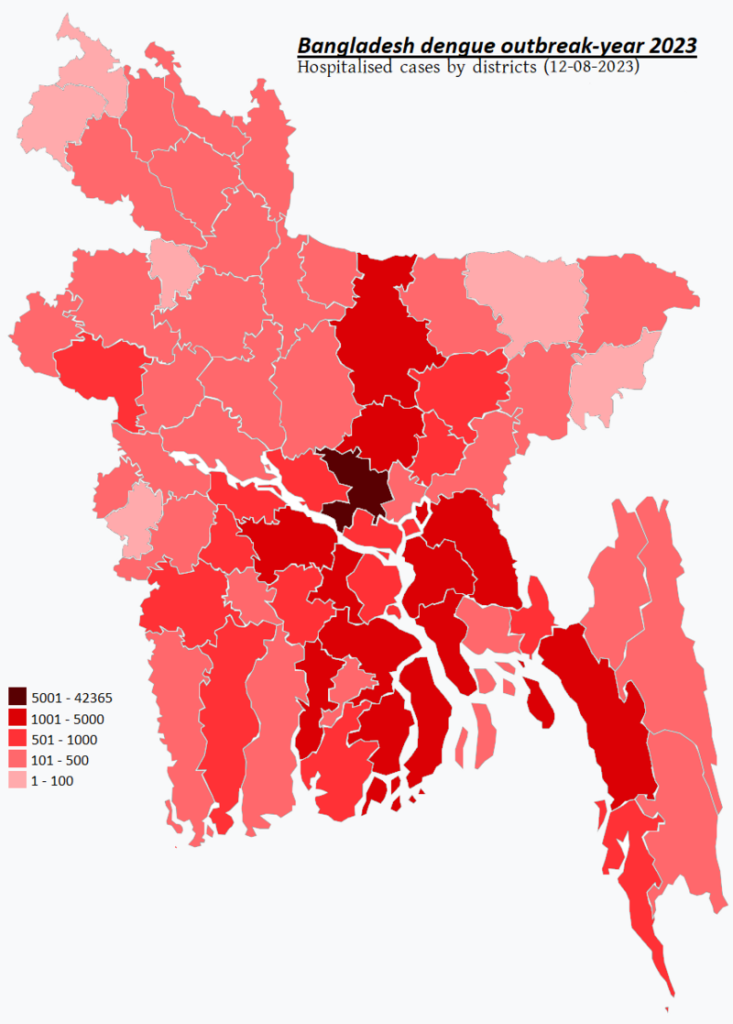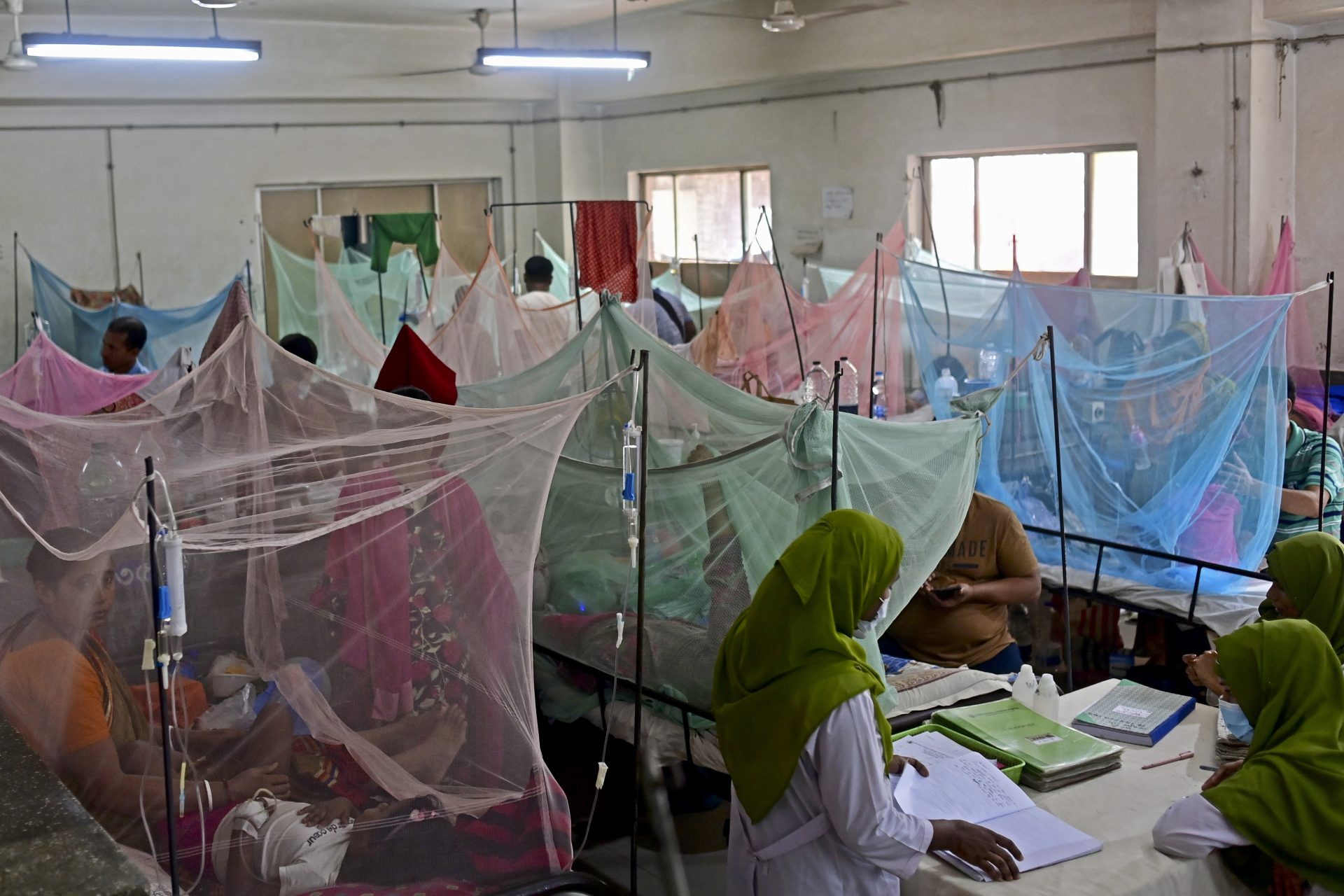Written byপান্থ রহমান রেজা (Pantha) Translated by Rezwan
The situation with mosquito-borne viral illness dengue has taken a perilous turn within Bangladesh. As of August 9, 2023, the number of fatalities has risen to 352 this year due to dengue, surpassing all previous records.
According to the data of the Directorate General of Health Services (DGHS) under the Ministry of Health, the count of dengue cases in July surged to over 43,800, a significant increase compared to the 5,900 cases in June. The upward trend is persisting into August 2023.
Although dengue was once considered a seasonal disease, primarily occurring during the monsoon season (July/August), in recent years, instances of dengue have been documented year-round. There are no concrete numbers, but this study published in BioMedCentral (BMC) journal, suggests that there were up to 2.4 million annual dengue cases in recent years in Bangladesh.
The dengue virus spreads via the bites of several species of female mosquitoes of the Aedes genus. Typically, dengue patients experience mild symptoms or remain asymptomatic and get better within two weeks as there is no specific treatment available. However, the spread can be controlled through the removal of potential mosquito breeding sites (such as clear and stagnant water) and practicing personal precautions, including the application of mosquito repellents and the use of mosquito nets.
Writer Dipu Mahmood shares a harrowing experience on Facebook. His son was infected with dengue earlier this month. He took him to a hospital in the capital Dhaka and found every bed occupied. The healthcare facilities are overwhelmed with dengue patients, and this is not an isolated incident. This type of experience resonates across social media platforms in Bangladesh, where countless posts highlight the lack of available hospital beds can be seen.
Why dengue endemic took a terrible turn
Dengue was first detected in Bangladesh in 1965, referred to as Dhaka fever during that time. During the 2000s, there has been a gradual increase in the number of cases. However, the question arises: why has the situation become so unmanageable at present?

As per the assessment of the World Health Organisation, this year there was an unusual quantity of rainfall, coupled with rising temperatures and high humidity, has contributed to this endemic. Experts say warnings were given at the beginning of the year. Nonetheless, the are doubts about the efficacy of the authorities’ measures to stop the spread of mosquitoes. Also, questions have been raised about the effectiveness of the insecticides used and the method to apply the insecticides to control mosquitoes. All these variables have combined to create a challenging situation where the country is struggling to cope with the endemic.
Bangladeshis are experiencing a heightened impact from DENV-3, which is the most pernicious strain of dengue virus this year. This variant is causing rapid reductions in patients’ blood platelet counts, leading to severe illness and necessitating hospitalization. Moreover, the virulence or infection capacity of this serotype is much higher. The patients can succumb to the infection within a mere two to three days.
Dewan Almina (32), a physician working at the Maternal and Child Health Institute in Matuail, Dhaka, was diagnosed with dengue encephalitis. Unfortunately, despite many efforts, she could not be saved. Her husband, also a physician, asserted that he lost his wife because the Dhaka City Corporation did not perform its duties properly to control mosquitoes. In an interview with the Daily Prothom Alo, he mentioned:
“A single mosquito bite destroyed my family. The children have become orphans. When they grow up, there will be no memory of their mother. No one can fill the place of their mother. My life also turned upside down. If there were no mosquitoes, this would not have happened.”
Hospitals are struggling to manage the surge in dengue patients and are unable to admit them properly. The Daily Star tweeted that some patients had to be accommodated on the floor:
Mosquitoes are also changing behavior
A research study conducted in 2023 by Dr. Kabirul Bashar, a Zoology professor at Jahangirnagar University, titled “Adaptation of Aedes aegypti Mosquito Larvae in Sewerage, Seawater, Brackish Water, and Drain Water: A New Challenge for Dengue Control”, has revealed a shift in the behavior of Aedes mosquitoes that carry the dengue virus. These mosquitoes were known to primarily bite during the early hours of the day and in the evening. However, recent research indicates that Aedes mosquitoes are now also active in biting during the night, albeit with lower frequency. This mosquito used to lay eggs in clean water, now it is laying eggs in dirty water too.
Research has indicated that the presence of light pollution in urban environments is a contributing factor to the altered behavior of mosquitoes. Earlier people did not use bright lights during the night. The breeding grounds of Aedes mosquitoes have also increased due to an increase in mega-construction sites. In addition to that, the growing consumption of packaged food and bottled beverages in both urban and rural areas is generating huge waste. Poor waste management practices have led to the accumulation of rainwater during the monsoon season, creating suitable environments for Aedes mosquito breeding. As a result, the population of dengue-carrying Aedes mosquitoes has increased.
A 2023 study titled “Insecticide Resistance Compromises the Control of Aedes aegypti in Bangladesh” revealed that Aedes mosquitoes in Dhaka are developing resistance to insecticides. As per the study, up to 74 percent of flying and resting mosquitoes survived even after the application of commercial insecticides.
Along with the change in the behavior of the Aedes mosquito, there has also been a change in the symptoms of dengue. Earlier dengue patients used to be admitted to the hospital with high fever. Whereas the current scenario involves a milder fever, including an increased shock to vital organs — resulting in a greater death toll. Dengue once considered an urban disease, is now extending its reach into rural regions. This year, dengue patients are coming to the hospital from all 64 districts of the country.
Although the mosquito control program of the authorities is usually blamed for the dengue outbreak, experts opine that a concerted effort of the authorities, with the involvement of communities and personal awareness is required to tackle the endemic.
Visit Global Voices for more related stories







